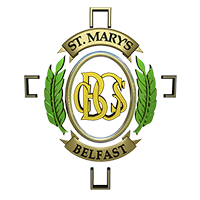Course Outline
Key Stage 3 students follow the Fully Alive Irish Catechetical Programme as published by Veritas, especially commissioned to suit the needs of the Revised Curriculum and in tandem with Diocesan guidelines. This resource is supplemented by the RE Department with units of work deemed appropriate to our school ethos such as the Edmund Rice unit of work for Year 8 students.
The programme offers our students the opportunity to develop their understanding of the Trinity, sacred scriptures, the sacraments and Church Tradition. By the end of Year 10, pupils will have also enjoyed learning about the beliefs and practices of other Christian denominations and some of the major world religions such as Judaism and Islam.
Course Outline
Pupils will complete the following programme of study over two years:
Year 11: A study of Mark’s Gospel and its relevance for the first followers of Jesus and Christians today.
Year 12: Christian Ethics – A study of ethical and moral issues directly related to life in the 21st Century.
Assessment
Each paper is worth 50% of the total GCSE and is taken in May or June of Year 12
Paper 1: Mark’s Gospel
Paper 2: Christian Ethics
Study/Homework Requirements:
Pupils will be required to complete one homework per week. This may take the form of written, research or revision assignments. When homework is not set pupils must spend time in personal study to ensure they have learned and understood the key concepts.
Each class will sit regular class and departmental tests. Upon receiving their results each student, in consultation with their class teacher and parents, will embark upon a process of self-evaluation and individual target setting.
Key Points To Success:
Regular personal study and consistent effort are required in this subject. Each pupil will sit regular exams and use this as a process of developing subject knowledge and confidence in their ability to maximise their potential.
Pupil success and under-achievement will be closely monitored by the class teacher and Head of Department. Early intervention and improvement targets will be set, monitored and updated where appropriate.
Course Outline
Year 13: An Introduction to the study of:
Module 1: An Introduction to the Gospel of Luke (20% of the total A Level)
Module 2: The Celtic Church in Ireland in the 5th, 6th and 7th Centuries (20% of the total A Level)
Year 14: A detailed study of:
Module 1: Themes in the Synoptic Gospels (30% of the total A Level)
Module 2: Themes in the Celtic Church, Reformation and Post-Reformation Church (30% of the total A Level)
Assessment
All students will complete two modules at the end of Year 13. Each module is worth 20% of the total A Level. Each Year 13 module examination lasts 1 hour 20 mins.
The final two modules will be sat in the summer term of Year 14. Each A2 module examination lasts 2 hours and is worth 30% of the total A Level.
Study/Homework Requirements:
Students can expect to receive two to three hours homework tasks per week. This will include a combination of personal research, reading tasks, note taking, revision for class exams and essay writing.
Candidates who wish to achieve the top grades must also commit themselves to extra personal study and reading time.
All students will sit monthly examinations which give an indication of their progress and potential. Those students who underachieve will be targeted for further, after school intervention and support.
Key Points To Success:
Unlike GCSE, A Level Religious Studies is a very demanding subject. It requires students to make a sustained and long-term commitment to revision and personal study. Success in this subject will require the candidate to develop detailed writing and analytical skills. Regular reading of the required texts married to consistent revision and exam practice is crucial.












